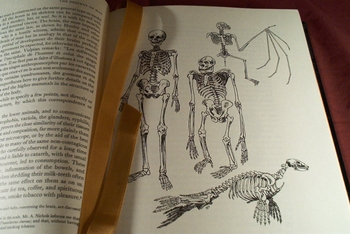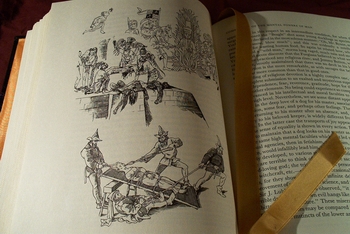Easton Press Charles Darwin books
The Descent of Man - 100 Greatest Books Ever Written - 1979
On the Origin of Species - 1991
The Journal of Charles Darwin
The Survival of Charles Darwin: A Biography of a Man and an Idea
The Voyage of The H.M.S. Beagle - Harvard Classics
Franklin Library Charles Darwin books
On the Origin of Species - 100 Greatest Books of All Time - 1975The Descent of Man - The Great Books of the Western World - 1980
Who was Charles Darwin?
Upon returning to England, Darwin began to develop his theory of natural selection, driven by the idea that species evolve over time through the differential survival and reproduction of organisms with advantageous traits. He meticulously gathered evidence, conducted extensive research, and corresponded with fellow scientists to refine his ideas. Charles Darwin had long been working on a theory of evolution which he was ready to publish when he received from his friend, A.R. Wallace, then in the East Indies, a manuscript setting forth substantially the same theory. He was at first disposed to withhold his own paper, and give precedence to Wallace, but on the advice of friends both papers were read at the same meeting of the Linnean Society of London and published together in their Transactions for 1858.
In 1859, Darwin published his groundbreaking work, On the Origin of Species by Means of Natural Selection, presenting his theory of evolution to the world. The book caused a significant scientific and cultural upheaval, challenging prevailing beliefs about the origin and diversity of life. Darwin's emphasis on evidence-based reasoning and his meticulous observations contributed to the widespread acceptance of evolutionary theory in the scientific community. In The Descent of Man (1871), Charles Darwin added to the controversy by advancing the theory that men and apes were descended from a common anthropoid ancestor.
Darwin's influence extended beyond biology. His ideas had profound implications for fields such as anthropology, psychology, and philosophy. They also sparked debates about religion, as his theory conflicted with prevailing interpretations of creation.Later in life, Darwin continued his scientific inquiries, publishing works on topics ranging from plant physiology to human evolution. He also became a fellow of the Royal Society and received numerous honors for his contributions to science. Charles Darwin passed away on April 19, 1882, leaving behind a scientific legacy that reshaped our understanding of life on Earth. His work laid the groundwork for modern evolutionary biology, and his intellectual courage in challenging prevailing beliefs has left an indelible mark on the scientific community and the way we comprehend the natural world.
Charles Darwin's other writings are supplemental to his works on evolution, and are largely based on the material gathered in the preparation of his great theory.
On The Origin of Species
Darwin's
theory of natural selection issued a profound challenge to orthodox
thought and belief: no being or species has been specifically created;
all are locked into a pitiless struggle for existence, with extinction
looming for those not fitted for the task.
Yet The Origin of
Species (1859) is also a humane and inspirational vision of ecological
interrelatedness, revealing the complex mutual interdependencies between
animal and plant life, climate and physical environment, and by
implication within the human world.
Written for the general
reader, in a style which combines the rigour of science with the
subtlety of literature, The Origin of Species remains one of the
founding documents of the modern age.
The classic that exploded
into public controversy, revolutionized the course of science, and
continues to transform our views of the world.
Few other books
have created such a lasting storm of controversy as The Origin of
Species. Darwin's theory that species derive from other species by a
gradual evolutionary process and that the average level of each species
is heightened by the "survival of the fittest" stirred up popular debate
to a fever pitch. Its acceptance revolutionized the course of science.
The Descent of Man
The
Descent of Man, Darwin's second landmark work on evolutionary theory
(following The Origin of the Species), marked a turning point in the
history of science with its modern vision of human nature as the product
of evolution. Darwin argued that the noblest features of humans, such
as language and morality, were the result of the same natural processes
that produced iris petals and scorpion tails.
In The Origin of
Species, Charles Darwin refused to discuss human evolution, believing
the subject too 'surrounded with prejudices'. He had been reworking his
notes since the 1830s, but only with trepidation did he finally publish
The Descent of Man in 1871. The book notoriously put apes in our family
tree and made the races one family, diversified by 'sexual selection' Darwin's provocative theory that female choice among competing males
leads to diverging racial characteristics. Named by Sigmund Freud as
'one of the ten most significant books' ever written, Darwin's Descent
of Man continues to shape the way we think about what it is that makes
us uniquely human.
The Voyage of the Beagle
The
Voyage of the Beagle is the title given to the book written by Charles
Darwin and published in 1839 as Journal and Remarks. It covers Darwin’s
part in the second survey expedition of the ship HMS Beagle. Due to
immense popularity of Darwin’s account, the publisher reissued it later
in 1839 as Darwin’s Journal of Researches. The revised second edition
published in 1845 also used this title. A republication of the book in
1905 introduced the title, The Voyage of the Beagle, by which it is now
known.
The Beagle sailed from Plymouth Sound on 27 December 1831
under the command of Captain Robert FitzRoy. Originally, the expedition
was planned for two years, but it lasted almost five years, with the
return of the Beagle on 2 October 1836. Darwin spent most of this time
exploring on land while the ship was on some shore.
The book is a
vivid and exciting travel memoir as well as a detailed scientific field
journal covering biology, geology, and anthropology. It was written at a
time when Western Europeans were exploring and charting the whole
world, and it demonstrates Darwin’s keen powers of observation.
Darwin’s
notes made during the voyage include comments hinting at his changing
views on the fixity of species. On his return, he wrote the book based
on these notes, at a time when he was first developing his theories of
evolution through common descent and natural selection. Thus, the
insights made during the voyage set in motion the mental activity that
led to the theory of evolution, and eventually the book, On the Origin
of Species, that made Darwin one of the most influential figures in
human history.
When the Beagle sailed out of Devonport on 27
December 1831, Charles Darwin was twenty-two and setting off on the
voyage of a lifetime.
It was to last five years and transform him
from an amiable and somewhat aimless young man into a scientific
celebrity. Even more vitally, it was to set in motion the intellectual
currents that culminated in the arrival of The Origin of Species in
Victorian drawing-rooms in 1859. His journal, reprinted here in a
shortened version, is vivid and immediate, showing us a naturalist
making patient observations, above all in geology. As well as a
profusion of natural history detail, it records many other things that
caught Darwin’s eye, from civil war in Argentina to the new colonial
settlements of Australia.




No comments:
Post a Comment
Share your best book review and recommendation